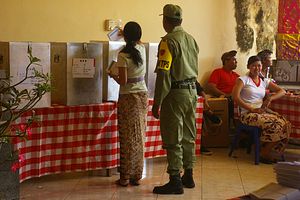The global media covered India’s recent general elections with considerable fanfare. Now it is Indonesia’s turn to go to the polls, and the world’s third largest democracy, most populous Muslim country, and largest economy in Southeast Asia deserves a lot more attention than its occasionally allotted thirty second afterthought. Indonesia, just like China and India, will be pivotal in shaping Asia in the decades to come, which is why the country and the outcome of its July 9 presidential election warrants a closer look.
The upcoming presidential election will set Indonesia on its future path, as the second and rather lackluster five-year term of current president, Susilo Bambang Yudhoyono, comes to an end. Indonesia’s new president will have the chance to sketch out a new vision for the future, but it is how effectively the next government can navigate and work through the country’s complex policymaking process that will truly decide Indonesia’s future.
Indonesia is in need of some forward momentum. The outgoing administration has notched some notable achievements over the last decade, not least in ensuring the stability and integrity of its 17,000 islands. The country has also continued to roll out decentralized democracy across its now 34 provinces and 510 districts, with district and provincial leaders elected directly at the local level and entrusted with the power and responsibility to provide the majority of services to their electorates. However, the president’s second term is widely considered to be disappointing. Indecision and a lack of substantive progress on some of Indonesia’s major policy challenges, coupled with a number of high-level corruption scandals, have characterized the president’s governing administration and his Democratic Party. This has resulted in an Indonesia that has not moved forward as quickly as many Indonesians would have hoped.
Indonesia still faces a number of tremendous challenges. Widespread corruption continues on a truly staggering scale. Regulatory and legal certainty across many areas has not improved and in some cases has gotten worse, most recently with the cancelling of investment treaties and the bungled implementation of a mineral ore export ban. Education outcomes and skills, especially at the senior secondary school level, are still poor with the country languishing toward the bottom end of many international league tables. Infrastructure, too, remains woeful across the archipelago and even in the nation’s capital, Jakarta. All of which makes it all the more difficult for the country to move up the economic ladder.
Clear policies and implementation is now needed to drive the country forward. Both of Indonesia’s presidential candidates, Joko Widodo, of the Indonesian Democratic Party of Struggle (PDI-P) and Prabowo Subianto of the Great Indonesia Movement Party (Gerindra), have outlined a series of populist policies accompanied with further pledges and proclamations during Indonesia’s five nationally televised debates, but neither candidate has offered any clear details about how they would be practically implemented or funded in many cases, mainly because a lot of this is beyond their control, despite the rhetoric.
One of the unique features of Indonesia’s democratic process is that despite pledges from the leadership at the top of political parties, they are often limited to setting broad policy goals and direction, as the practical policy outcomes are made much lower down the chain in closed-door committees in the Indonesian parliament and out in Indonesia’s decentralized districts. Despite the media hype and the reporting of every word and detail that comes out of the presidential candidates mouths, a lot of the time these can be quite irrelevant to practical policy outcomes.
Another factor is that the political parties themselves are far from cohesive bodies, which contributes to the complexities, contradictions and confusion associated with the Indonesian political process. At best, political parties are broad coalitions, but contain much less of the clear left-right political ideology and divides that characterizes many parties elsewhere in the world, with most of the actual differences focusing more on a religiously based spectrum of Islamic or broadly secular nationalist identity. Moreover, some of Indonesia’s major political parties are built solely as vehicles for their leaders to seek the presidency, not as vehicles of political ideology. Current President Susilo Bambang Yudhoyono’s Democratic Party was formed purely for the purpose of putting him in office. Likewise with current presidential candidate Prabowo’s Gerindra Party.
Even then, apart from senior leadership, national and local rank-and-file party members often join more for the purposes of political convenience and practicality than either real loyalty to their leaders or a clear alignment to the prescribed policy direction. Parliamentary candidates choose and change parties for the purposes of getting elected. What this results in is parties at the national and local level that are far from aligned with party messages and polices emanating from the top. This also goes some way to explaining the lack of clear political identity and policy prescriptions of Indonesia’s main political parties.
When it comes to the formulation of policy and practical outcomes, the necessity of coalition building to get bills through the Indonesian parliament means Indonesia’s political process is all about compromise, consensus, and especially horse trading behind the scenes – where accountability is lax and corruption often emanates as candidates try to gain and recoup the vast fortunes needed to run for political office. Proclamations from the top count for less, which can result in completely contradictory policy outcomes and a disconnect between what is said and the legislation that is finally passed.
The challenge for Indonesia’s next president will be to navigate this complex process and implement many of the reforms that Indonesia badly needs. Come October, when both the new parliament and president are sworn in, Indonesians will be expecting tangible results from their new political leaders.
Edward Parker is a contributor living and working in Jakarta, with previous professional experience working on Indonesian governmental and policy issues. He writes here in a personal capacity and the views expressed are his own. He can be followed on twitter @EdinIndo.

































